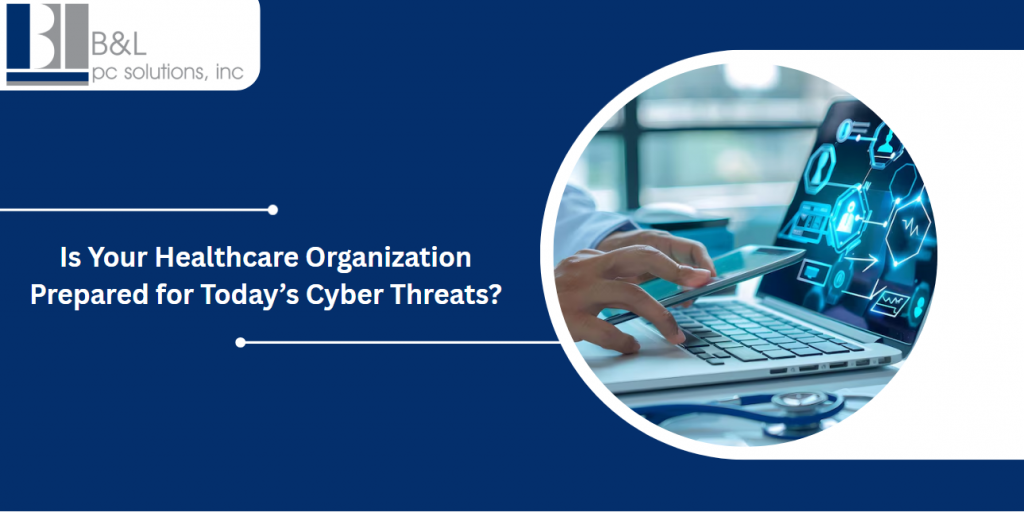
Have you experienced a ransomware attack where patient records, appointment calendars and other crucial information remain inaccessible?
This is no longer an exception affecting only a few leading healthcare organizations. The healthcare industry in the US had to deal with hundreds of such cybersecurity incidents this year. They included ransomware attacks and data breaches. And here's what should keep you alert. More than 90% of healthcare providers reported dealing with at least one cyberattack last year.
If you are running such a facility, remember you are a target. The question is not if you will face a cyber threat. It's a matter of when and whether you will be ready when it happens.
Why Hackers Want Your Healthcare Data
So why are medical services on the radar of hackers?
Your patient records are worth way more on the black market than stolen credit cards. Someone swipes a credit card number, and the bank can cancel it within hours.
The same doesn’t happen with medical records. They contain social security numbers, birth dates, insurance details, full medical histories, addresses, and phone numbers. That data stays valuable for years because you can't just ‘cancel’ your medical history. Consider what flows through your systems on a daily basis.
- Electronic health records with complete patient histories.
- Billing information tied to insurance providers.
- Prescription records.
- Lab results.
- Diagnostic images.
These systems are connected with others in some way. Your EHR connects to your billing software. Your imaging machines link to your network. Every link and device offers another possible entry point for attackers.
Many health services are still dependent on outdated systems because upgrading is expensive and disruptive. What most health services do not understand is that the old systems were not designed to solve today's threats. They no longer receive security patches. They are missing basic protections.
Hackers know where to search for these vulnerabilities. These flaws simply sit there waiting to be exploited without someone continually checking.
The Huge Cost You Must Pay When Things Go Wrong
Let’s break down what actually happens when a healthcare organization gets hit by cybercriminals. The 2025 numbers are shocking. Three out of four healthcare organizations reported huge losses from cyberattacks. Many such attacks have cost companies millions of dollars. Yet, those figures hardly reveal the actual extent of the damage.
The ransom itself is always a colossal sum. Then there are emergency IT costs, forensic investigators determining the cause of the incident, system rebuilds, notification requirements, credit monitoring for affected patients, and legal fees. HIPAA fines can run into millions, depending on the severity of the security breach.
The operational chaos that comes with a cyber incident is worse than the bills. You might need to postpone operations and cancel hundreds of meetings. Doctors may have had to rely on paper records and hope they recall crucial information regarding a patient's therapies and allergies.
Do these attacks actually endanger lives? Of course, yes.
- When a hospital system goes down, emergency rooms cannot access patient histories.
- Operations are postponed when doctors have to work without access to patient information.
The damage it does to the reputation of your organization is the worst part of the story.
You spend years building trust with your community. Patients share their most private health concerns with you. A single instance of breach, and that trust disappears. Patients leave, and referrals dry up. Other physicians stop referring patients to you. Some practices never fully recover from this disaster.
The Role of a Good IT Support
Using professional IT assistance differs greatly from having a tech-savvy staff member running computers. You need a full-fledged IT system that always protects you.
With cutting-edge technologies, Managed IT Services On Long Island constantly scan your network in real-time.
- They flag any unusual login attempts from strange locations.
- They look out for large data transfers at odd hours.
- They instantly block any unauthorized access attempts.
Often, threats are neutralized before anyone on your team even knows something happened.
Most organizations do not take security updates seriously. New vulnerabilities are discovered constantly. Software companies release patches to fix them. But those patches need to be tested and deployed quickly.
Professional IT teams handle this systematically. They close security holes before attackers can exploit them. They also know how to protect those older systems you can't afford to replace yet, wrapping additional security around outdated technology.
Backup and disaster recovery is your ultimate insurance policy. A professionally managed IT support sets up automated backups that create multiple copies of everything critical. These backups get stored securely off-site. If ransomware strikes, you just ignore the demands for huge sums of money and simply restore from backups. Even if there is a system crash or serious hardware failure, managed IT services will ensure you are back up and running within hours, instead of weeks.
It’s About Building Actual Security and Not Just Checking Boxes
Installing one basic security program isn't enough. Real cybersecurity works in layers.
Firewalls and intrusion detection systems are your outer defenses. They filter traffic coming into your network and block obvious threats. But modern attacks are sophisticated. They slip past basic protections. That's why you need multiple layers.
Encryption is non-negotiable for healthcare businesses. It encrypts your data, so even if someone steals it, they can't read it. Your patient records, billing information and all sensitive data should be encrypted both when stored and during transfer. It reduces your legal liability if a violation occurs.
Access controls determine who should see your critical data.
- Your front desk staff doesn't need to see detailed clinical notes.
- Your billing department doesn't need full access to treatment records.
Multi-factor authentication means staff prove their identity through multiple methods before accessing sensitive data. What if someone steals a password? They still can't get in without the second factor.
Are Your Employees Your Weakness or Your Strength
Remember this! If you have one casual person in the organization, even the most advanced security system in the world won't keep your company from being hacked.
The most commonly used technique for hackers to access healthcare networks is phishing. These emails seem really real. They could seem to originate from reliable sources, including a co-worker, a patient, or even a software provider. If someone clicks such a link or downloads an infected attachment, the attacker can reach your network.
New studies reveal that web apps made up 96% of security problems affecting medical systems. The majority of these stem from human error. Which actions should you take?
- Do not consider security as a one-time thing. It must be ongoing.
- Every staff member handling IT must be trained to spot unauthorized entry.
- They need to know how to distinguish between real and fake emails.
- They must know the process of reporting suspicious emails
Simulated phishing exercises can be really effective. You send fake (but safe) phishing emails to your staff and see who clicks. The people who click get additional training, not punishment. Over time, your staff will become better at recognizing threats. They become your human firewall.
HIPAA Should Not Be About Avoiding Fines
HIPAA compliance is a legal necessity. The penalties for violations are harsh. However, viewing compliance as merely a regulatory checkbox overlooks the entire point.
These regulations exist because they work. They represent proven methods for protecting patient information that have been tested and refined over the years. Following HIPAA requirements means implementing security practices that actually protect your patients.
Expert IT assistance helps you stay compliant. They carry out regular audits, manage risk evaluations, put necessary precautions into place, and preserve records.
Good compliance shows patients that you highly respect their privacy. Data breaches generate headlines every day. Patients are more aware of these risks than ever. Being able to say you've never had a breach, that you maintain rigorous security standards, that you're fully HIPAA compliant. That's a huge competitive advantage.
Choose Your IT Systems Protector Carefully
Not all IT support services are the same. Healthcare has unique requirements that generic IT services often fail to understand.
Look for providers with specific healthcare experience. They should be thoroughly familiar with HIPAA. They should understand medical workflows, the software you use, and the equipment you rely on. They must provide quick response times and proactive monitoring in the event of problems.
They need to have accurate information on security matters, have solutions ready before any problems surface, and empower you to make informed technology investments.
Don’t go for cheap fixes or standard solutions. They will do your business no good.
Your Plan for the Future
A single breach can cost you more than a decade of professional IT support. Beyond the immediate financial impact, there are operational disruptions, reputation damage, and a loss of trust. Cybersecurity and IT support must not be seen as extra expenses. They are fundamental infrastructure for operating a healthcare practice smoothly and peacefully in 2025.
We built B&L PC Solutions specifically around what healthcare organizations need because we saw too many practices closing down due to attacks they could have prevented.
Every day, we interact with healthcare professionals. That’s why we understand your challenges better. Our staff keeps you compliant with demands, stays ahead of emerging dangers, and ensures your technology genuinely supports patient care.
Call us now to get a detailed view of our healthcare-specific IT support and cybersecurity solutions.
Tags: CyberSecurity, Healthcare, ITSupport





